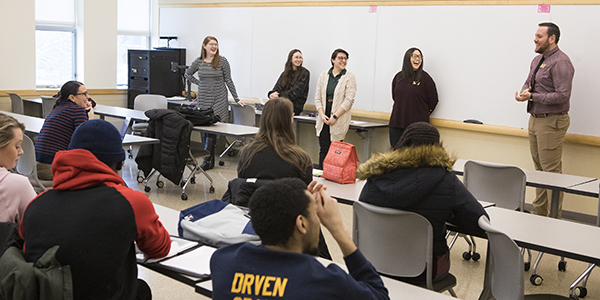MSW interns continue to be there for students — remotely
Residential Life─Department of Social Work partnership offers students options for support.

Being a college student before the COVID-19 pandemic was stressful enough. With students’ personal and academic routines disrupted due to the coronavirus pandemic, one of the University’s newest and fastest-growing mental health resources continues to help.
The Residential Life MSW program is a partnership with the Department of Social Work that has residents meet with Master of Social Work (MSW) interns who can help them manage a specific problem or challenge and find a solution. Interns can also direct residents to other resources for longer-term or more specialized counseling.
In this time of social distancing, these services are still fully available — now just remotely.
“Luckily, the interns have to use Zoom for their school classes, so all of them were very familiar and comfortable with using it very quickly. So, on our end it was a pretty smooth transition,” said Jessica Treadwell, a crisis response manager in the Office of Residential Life who supervises the program.
The program is making sure to institute Zoom’s increased security enhancements to assure privacy.
Treadwell said interns are able to work with students who are concerned about preserving confidentiality in sessions while living at home. Students can schedule a Zoom session with an intern, but can also use the Zoom chat feature to discuss more delicate matters. In addition, students can engage in a back-and-forth dialogue with the interns over email.
“A big thing we’ve been hearing (from students) is just trying to re-establish boundaries with family,” said Treadwell. “Especially for first-year students who have gotten a big taste of that independence and then had it removed from them a little sooner than they were planning!”
Mar Santos, an MSW intern working with the Mountainview College community, said students are feeling a range of emotions during this unprecedented time.
“Some students are feeling anxious about all of the health concerns and some are hoping things are going to blow over soon,” Santos said, adding that much of their anxiety stems from what they are seeing online.
“A lot of students will share that they are comparing their experiences to those of their friends and peers on social media, which can cause feelings of loneliness,” Santos said. “Now that most of us are being required to self-isolate and are probably using social media as a main method of socialization, this may be exacerbating those feelings of loneliness for our students.”
When students are on campus, there is an MSW intern connected with each living community. Resident assistants (RAs) are the first line of defense and can serve as a referral for students to speak with the MSW interns working within that community. Santos, a former RA, sits in on Mountainview staff meetings and works with staff on various projects.
And the students who have remained on campus haven’t been left behind. Treadwell and her staff have reached out to every student still on campus to remind them that they are available and how to access the program’s services.
The Residential Life MSW program started in August 2019, with just under 300 students seen during the fall semester. For the spring semester, Treadwell said interns had already seen over 300 students by the end of February.
The interns had also just begun psychoeducation courses focused on “socialization” (adjusting to college life) and “stress and anxiety” that were put on hold due to the coronavirus. When students return to campus, they’ll pick up again, with two to three interns teaching each course of six to eight sessions, with 15 to 25 students per class.
Students who would like to reach out to the interns or find out more information about the program can do so online.

